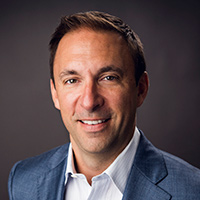Are Your Financial Plan and Adviser the Right Fit for You Now?
A shift into retirement requires a shift in your financial plan, from the accumulation stage to the distribution stage. Maybe your financial adviser needs to change, too.


Profit and prosper with the best of Kiplinger's advice on investing, taxes, retirement, personal finance and much more. Delivered daily. Enter your email in the box and click Sign Me Up.
You are now subscribed
Your newsletter sign-up was successful
Want to add more newsletters?

Delivered daily
Kiplinger Today
Profit and prosper with the best of Kiplinger's advice on investing, taxes, retirement, personal finance and much more delivered daily. Smart money moves start here.

Sent five days a week
Kiplinger A Step Ahead
Get practical help to make better financial decisions in your everyday life, from spending to savings on top deals.

Delivered daily
Kiplinger Closing Bell
Get today's biggest financial and investing headlines delivered to your inbox every day the U.S. stock market is open.

Sent twice a week
Kiplinger Adviser Intel
Financial pros across the country share best practices and fresh tactics to preserve and grow your wealth.

Delivered weekly
Kiplinger Tax Tips
Trim your federal and state tax bills with practical tax-planning and tax-cutting strategies.

Sent twice a week
Kiplinger Retirement Tips
Your twice-a-week guide to planning and enjoying a financially secure and richly rewarding retirement

Sent bimonthly.
Kiplinger Adviser Angle
Insights for advisers, wealth managers and other financial professionals.

Sent twice a week
Kiplinger Investing Weekly
Your twice-a-week roundup of promising stocks, funds, companies and industries you should consider, ones you should avoid, and why.

Sent weekly for six weeks
Kiplinger Invest for Retirement
Your step-by-step six-part series on how to invest for retirement, from devising a successful strategy to exactly which investments to choose.
Whether it’s clothes, hobbies or interests, over the course of your life, you outgrow things. At some point, the same will be true of your financial plan. You’ll reach an age when it no longer fits, and the focus of the plan needs to shift because of changing investment strategies in retirement.
This shift happens because your needs are different when you are younger than when you are nearing or entering retirement. A younger you is in the accumulation stage of retirement planning, stashing away as much money as possible and investing it for big gains. Later in life, as priorities and needs change, you enter the distribution stage, where those savings become your source of income. At this point, your investment goal becomes preservation, to protect what you have for the remainder of your years.
Each financial stage of your life is important, however, because each one involves different goals, and they call for different investment strategies, they may also call for a different financial professional to help you navigate the changes.
From just $107.88 $24.99 for Kiplinger Personal Finance
Become a smarter, better informed investor. Subscribe from just $107.88 $24.99, plus get up to 4 Special Issues

Sign up for Kiplinger’s Free Newsletters
Profit and prosper with the best of expert advice on investing, taxes, retirement, personal finance and more - straight to your e-mail.
Profit and prosper with the best of expert advice - straight to your e-mail.
Let’s explore why.
Journeying Through the Accumulation Stage
At this point, retirement lies in the distant future, offering you the flexibility to be aggressive with your investments. After all, time is on your side. Have you ever watched a football game and heard the announcer refer to the clock as a team’s friend or a team’s enemy? The same applies to retirement planning. When you are younger, the clock is an ally. If you are 35, you can worry less about market drops than a 65-year-old, because you still have years to recover from the potential blow to your portfolio.
Younger investors can even take advantage of market lows by purchasing more stocks at a cheaper price. A bear market may be a good time to convert a traditional IRA to a Roth IRA. You pay taxes when you make the Roth conversion, but when the recovery happens, that money will grow tax free.
Another way to combat market volatility during the accumulation stage is through dollar-cost averaging with automatic stock purchases.
Here’s how it works: You invest the same amount of money in a target security at regular intervals over a certain period of time. The logic behind this is that you will lower your average cost per share and reduce the impact a volatile market might have on your portfolio. Through this approach, since the trades are automatic, you aren’t trying to time the market.
The Paycheck Advantage
One final – but extremely important – advantage of the accumulation stage is the ever-popular paycheck! By using this income source to pay your bills and living expenses, you won’t need to touch the balance growing in your retirement portfolio.
Knowing this, your financial professional may point you toward more aggressive investments, even though your personal risk tolerance can come into play. Your adviser knows, as his or her advice should indicate, that this is the best time of life to go on the offensive with your investments.
As your work years evolve into your golden years, your paycheck earnings become less of a factor and your financial picture takes on a new look.
As your needs and situation change, so must your strategies. Time is no longer so friendly, and a market downturn can prove devastating since you no longer have the luxury of years to recover. Furthermore, your need for account withdrawals can’t always be timed with the markets and can create a more difficult situation from which to recover. As you move into this distribution stage of your financial plan, it’s a good idea to rebalance your portfolio to make sure you’re not weighted too heavily on risky investments.
Creating a Reliable Income Plan
That paycheck you relied on in your working years also will be gone in retirement, so you will need to create an income plan. The first step to doing that is to add up your monthly bills and other expenses. That will give you an idea of how much income you need. (Some people suggest retirees need 80% of their preretirement income, but I’m unconvinced that a 20% pay cut will allow you to continue your lifestyle.)
Throughout retirement, you don’t want just income, you want the protection of guaranteed income. The question is: Where will it come from? One source is Social Security, but unfortunately, too many people claim their Social Security benefit too early and leave a lot of money on the table. You can take Social Security as early as 62, or you can wait as late as 70, and the difference in the amount you receive can be enormous. Your financial professional can help you figure out the best time for you to claim your benefit.
Other sources of guaranteed income in retirement can be pensions (although fewer people have those these days) and annuities, which are insurance products you purchase that can work like pensions.
As you can see, the distribution stage requires an entirely different mindset than the accumulation stage. This is just one reason why your financial adviser needs to be the right fit for your current situation. There are various ways to grow your savings and take risks in the accumulation stage of your life.
However, the stakes are higher during retirement, and you want to make sure your adviser is someone with a greater understanding of the distribution stage and how to best address your investment goals. Such a person will be better equipped to help you with tax-efficient strategies for tapping into your retirement funds, long-term care strategies and other issues.
When’s a Good Time to Evaluate Your Needs?
The best time to revisit whether you are with the right adviser is during the transition period between accumulation and distribution. For most, this ends up being between ages 55 and 60.
When choosing a financial adviser, you should seek recommendations from people you trust who are also in the same phase as you or are already retired. Do your research to find an adviser who specializes in developing retirement strategies. Check their background and their experience. Make sure you take the time to interview advisers and find out what sets them apart from others.
But don’t forget it’s a two-way street, and they need to interview you to ensure they can best suit your needs or make a referral to someone who may be a better fit.
Distribution advisers who assist you into and through retirement should be focused on creating a plan that addresses your income, taxes, health care, estate planning and, of course, your investments.
Finding an adviser who brings multiple years of experience to the table is essential, but the most important thing is to determine whether you are comfortable with their personal or professional style. Do you trust them to manage your money and see them as a partner for your financial future?
You worked hard to save for retirement. This is the perfect time to make sure your money is now working for you and that it lasts as long as you need it!
The appearances in Kiplinger were obtained through a PR program. The columnist received assistance from a public relations firm in preparing this piece for submission to Kiplinger.com. Kiplinger was not compensated in any way.
Profit and prosper with the best of Kiplinger's advice on investing, taxes, retirement, personal finance and much more. Delivered daily. Enter your email in the box and click Sign Me Up.

Patrick W. Ayers is the founder of Ayers Financial Services. A graduate of Virginia Tech, where he earned a degree in finance, he maintains the designation of Registered Financial Consultant and is a member of the Association of Registered Financial Consultants and the International Association of Financial Planning.
Ayers shares his wisdom as weekly host of the “Financial Sanity” radio show and often serves as a guest speaker on radio and television, and he frequently holds informational seminars for corporations, universities, charities and individuals. He and his wife, Tara, and their three children live in Roanoke, Virginia. His interests include his kids’ sports, listening to music and watching Virginia Tech “Hokie” football.
Securities and advisory services are offered through Madison Avenue Securities, LLC (MAS), member FINRA/SIPC, and a Registered Investment Advisor. MAS and Ayers Financial Services are not affiliated entities.
The opinions of Patrick Ayers and Ayers Financial Services are their own.
-
 Nasdaq Leads a Rocky Risk-On Rally: Stock Market Today
Nasdaq Leads a Rocky Risk-On Rally: Stock Market TodayAnother worrying bout of late-session weakness couldn't take down the main equity indexes on Wednesday.
-
 Quiz: Do You Know How to Avoid the "Medigap Trap?"
Quiz: Do You Know How to Avoid the "Medigap Trap?"Quiz Test your basic knowledge of the "Medigap Trap" in our quick quiz.
-
 5 Top Tax-Efficient Mutual Funds for Smarter Investing
5 Top Tax-Efficient Mutual Funds for Smarter InvestingMutual funds are many things, but "tax-friendly" usually isn't one of them. These are the exceptions.
-
 Social Security Break-Even Math Is Helpful, But Don't Let It Dictate When You'll File
Social Security Break-Even Math Is Helpful, But Don't Let It Dictate When You'll FileYour Social Security break-even age tells you how long you'd need to live for delaying to pay off, but shouldn't be the sole basis for deciding when to claim.
-
 I'm an Opportunity Zone Pro: This Is How to Deliver Roth-Like Tax-Free Growth (Without Contribution Limits)
I'm an Opportunity Zone Pro: This Is How to Deliver Roth-Like Tax-Free Growth (Without Contribution Limits)Investors who combine Roth IRAs, the gold standard of tax-free savings, with qualified opportunity funds could enjoy decades of tax-free growth.
-
 One of the Most Powerful Wealth-Building Moves a Woman Can Make: A Midcareer Pivot
One of the Most Powerful Wealth-Building Moves a Woman Can Make: A Midcareer PivotIf it feels like you can't sustain what you're doing for the next 20 years, it's time for an honest look at what's draining you and what energizes you.
-
 I'm a Wealth Adviser Obsessed With Mahjong: Here Are 8 Ways It Can Teach Us How to Manage Our Money
I'm a Wealth Adviser Obsessed With Mahjong: Here Are 8 Ways It Can Teach Us How to Manage Our MoneyThis increasingly popular Chinese game can teach us not only how to help manage our money but also how important it is to connect with other people.
-
 Looking for a Financial Book That Won't Put Your Young Adult to Sleep? This One Makes 'Cents'
Looking for a Financial Book That Won't Put Your Young Adult to Sleep? This One Makes 'Cents'"Wealth Your Way" by Cosmo DeStefano offers a highly accessible guide for young adults and their parents on building wealth through simple, consistent habits.
-
 Global Uncertainty Has Investors Running Scared: This Is How Advisers Can Reassure Them
Global Uncertainty Has Investors Running Scared: This Is How Advisers Can Reassure ThemHow can advisers reassure clients nervous about their plans in an increasingly complex and rapidly changing world? This conversational framework provides the key.
-
 I'm a Real Estate Investing Pro: This Is How to Use 1031 Exchanges to Scale Up Your Real Estate Empire
I'm a Real Estate Investing Pro: This Is How to Use 1031 Exchanges to Scale Up Your Real Estate EmpireSmall rental properties can be excellent investments, but you can use 1031 exchanges to transition to commercial real estate for bigger wealth-building.
-
 Should You Jump on the Roth Conversion Bandwagon? A Financial Adviser Weighs In
Should You Jump on the Roth Conversion Bandwagon? A Financial Adviser Weighs InRoth conversions are all the rage, but what works well for one household can cause financial strain for another. This is what you should consider before moving ahead.